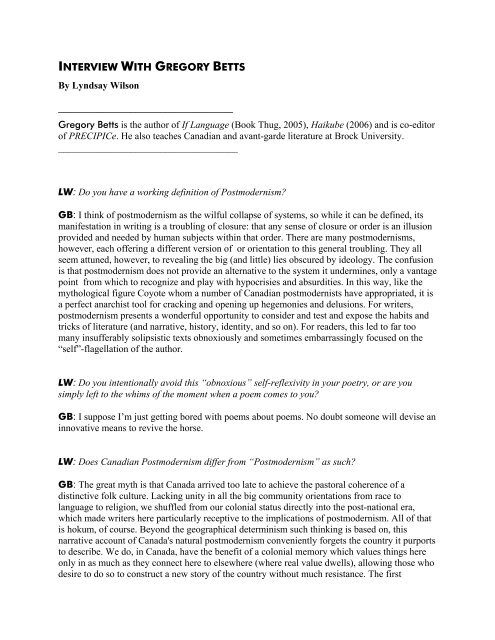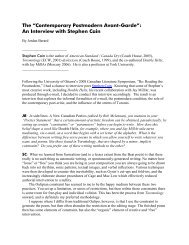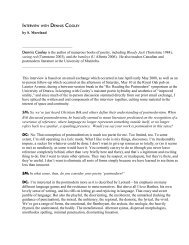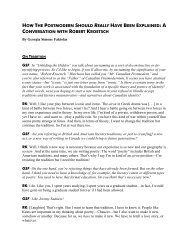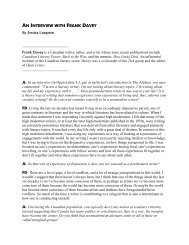Interview with Gregory Betts - The Canadian Literature Symposium
Interview with Gregory Betts - The Canadian Literature Symposium
Interview with Gregory Betts - The Canadian Literature Symposium
You also want an ePaper? Increase the reach of your titles
YUMPU automatically turns print PDFs into web optimized ePapers that Google loves.
INTERVIEW WITH GREGORY BETTS<br />
By Lyndsay Wilson<br />
____________________________________<br />
<strong>Gregory</strong> <strong>Betts</strong> is the author of If Language (Book Thug, 2005), Haikube (2006) and is co-editor<br />
of PRECIPICe. He also teaches <strong>Canadian</strong> and avant-garde literature at Brock University.<br />
_____________________________________<br />
LW: Do you have a working definition of Postmodernism?<br />
GB: I think of postmodernism as the wilful collapse of systems, so while it can be defined, its<br />
manifestation in writing is a troubling of closure: that any sense of closure or order is an illusion<br />
provided and needed by human subjects <strong>with</strong>in that order. <strong>The</strong>re are many postmodernisms,<br />
however, each offering a different version of or orientation to this general troubling. <strong>The</strong>y all<br />
seem attuned, however, to revealing the big (and little) lies obscured by ideology. <strong>The</strong> confusion<br />
is that postmodernism does not provide an alternative to the system it undermines, only a vantage<br />
point from which to recognize and play <strong>with</strong> hypocrisies and absurdities. In this way, like the<br />
mythological figure Coyote whom a number of <strong>Canadian</strong> postmodernists have appropriated, it is<br />
a perfect anarchist tool for cracking and opening up hegemonies and delusions. For writers,<br />
postmodernism presents a wonderful opportunity to consider and test and expose the habits and<br />
tricks of literature (and narrative, history, identity, and so on). For readers, this led to far too<br />
many insufferably solipsistic texts obnoxiously and sometimes embarrassingly focused on the<br />
“self”-flagellation of the author.<br />
LW: Do you intentionally avoid this “obnoxious” self-reflexivity in your poetry, or are you<br />
simply left to the whims of the moment when a poem comes to you?<br />
GB: I suppose I’m just getting bored <strong>with</strong> poems about poems. No doubt someone will devise an<br />
innovative means to revive the horse.<br />
LW: Does <strong>Canadian</strong> Postmodernism differ from “Postmodernism” as such?<br />
GB: <strong>The</strong> great myth is that Canada arrived too late to achieve the pastoral coherence of a<br />
distinctive folk culture. Lacking unity in all the big community orientations from race to<br />
language to religion, we shuffled from our colonial status directly into the post-national era,<br />
which made writers here particularly receptive to the implications of postmodernism. All of that<br />
is hokum, of course. Beyond the geographical determinism such thinking is based on, this<br />
narrative account of Canada's natural postmodernism conveniently forgets the country it purports<br />
to describe. We do, in Canada, have the benefit of a colonial memory which values things here<br />
only in as much as they connect here to elsewhere (where real value dwells), allowing those who<br />
desire to do so to construct a new story of the country <strong>with</strong>out much resistance. <strong>The</strong> first
<strong>Canadian</strong> postmodernists thought the troubling would free <strong>Canadian</strong>s to become themselves, to<br />
discover or perhaps invent a language to unify and enable us. That didn't happen. <strong>The</strong> illusions<br />
were rather deferred (i.e. a riddle: a bilingual expression of <strong>Canadian</strong> identity—NO/US).<br />
LW: Where does your work fit into Postmodernism, if at all?<br />
GB: Postmodernism, particularly its more oneiric theories, definitely influences my work, but as<br />
a problem rather than a solution. It's like walking beside a bottomless chasm. You can pretend to<br />
ignore it, but it is still there, threatening if you make a false move. Postmodernism has revealed a<br />
significant gap in the logic by which we understand ourselves and our world. As an indirect<br />
consequence, authors and theorists that have responded and presumed to overcome the abyss<br />
become all the more fascinating and improbable. In Canada, there have been three particularly<br />
elaborate and fascinating trajectories of responses to the quagmire: the idealists (from Bucke to<br />
Brooker to McLuhan), the surrealists (from Borduas to Gauvreau to Hausner), and the<br />
“pataphysicists” (from Dewdney to McCaffery to Bök). My own writing falls somewhere in<br />
between and <strong>with</strong>in these strands of activity.<br />
LW: Does your work as an academic intersect <strong>with</strong> your work as a poet? When you write, do<br />
you work <strong>with</strong> your knowledge of <strong>Canadian</strong> poetry?<br />
GB: On bad days, it’s a day job like any other. On good days, I have the opportunity to work<br />
<strong>with</strong> interested and interesting people on topics of high interest to me. <strong>The</strong> idea of recall and<br />
influence is fascinating. I suspect everything I read alters what I write to some sublimely<br />
imperceptible degree. Most of my writing, especially my plunderverse projects, attempt to<br />
foreground that influence by writing <strong>with</strong>in the text of another author—deleting letters, for<br />
instance, selectively can create a poem that ‘sounds like me’ but includes that other author even<br />
at the surface of the language. So, instead of trying to hide the writers that have influenced me<br />
somewhere behind or obscured in the text, these projects make of that a starting point and an<br />
access point into my own voice.<br />
LW: What impact – if any – does Canada have on your work? Does it “matter” that you’re a<br />
<strong>Canadian</strong> poet? Do you think <strong>Canadian</strong>s are receptive to poetry? Is it a good time to be a poet in<br />
Canada?<br />
GB: Well, it is far more significant in this world that it remains a bad time to be poor, as it has<br />
always been. But as your question suggests, it is a particularly good time to be a <strong>Canadian</strong><br />
poet—not for audience attention, but for funding and acknowledgement. A publisher friend in<br />
New York runs a press that covers “<strong>The</strong> Americas,” especially Central America, but refuses to<br />
include <strong>Canadian</strong>s in his series because “any <strong>Canadian</strong> <strong>with</strong> any talent in literature can get<br />
published.” <strong>The</strong> same is not true in many other parts of the world. It doesn’t mean that we are<br />
producing the best literature in the world, but it does mean that it has never been easier to be a<br />
writer in this country. I’m drawn to the early <strong>Canadian</strong> writers that managed to achieve<br />
something remarkable in a decidedly hostile environment—no funding, no publishers, no little
literary mags, no big literary mags, no cheap mail service, and so on. But then again, I’m also<br />
drawn to the Sisyphus myth. In turn, just when it has become relatively easy to be a writer in this<br />
country, the audience is rolling away down the other side of the hill towards greener e-pastures.<br />
As a <strong>Canadian</strong> myself, it doesn’t “matter” to me; it is the circumstance I inherited. I’ve spent a<br />
lot of time trying to develop a sense of what “Canada” might possibly mean, and there are<br />
millions upon millions of possibilities. Any attempt to consolidate those possibilities into a<br />
stability is an illusion. As a writer, I’m drawn to the power of illusions—as potential realities<br />
more so than as prescriptions of the way things are. If Dion’s Canada includes Quebec, my<br />
Canada includes anything that might be said.<br />
LW: What prompted you to use anagrams as a form of writing poetry?<br />
GB: <strong>The</strong> anagram is the perfect symbol of recycling in literature. It is a brand of ecological<br />
poetry that by form alone approximates nature more than any precious poem.<br />
It’s also a lot like the moment “now”—the past is locked, the future is deferred and<br />
potential; “now” is always new and magical but ultimately slippery if you try to put your finger<br />
on it. When you write anagrams you become very conscious of all of the other possible<br />
anagrams—a recombinant “future”—buried in those letters. You start to feel them speaking<br />
through the language even as you are trying to use it to say something else. <strong>The</strong> letters collapse<br />
into abstraction, and coalesce into a flash solution—a “now” emerges like an uncanny answer.<br />
But like “now,” anagrams make you realize that you cannot stop language. We take photos to<br />
pretend we’re stopping time. We write things down to much the same effect. Anagrams are a<br />
form of writing that somehow eludes the illusion of capturing or stopping time. <strong>The</strong>y insist on<br />
rupture.<br />
To return to the ecology of the anagram, the shifting letters push up and out like weeds from<br />
the concrete of expression.<br />
LW: What did you enjoy about working <strong>with</strong>in the confined system of If Language?<br />
GB: It began by reading an essay by Steve McCaffery, then re-reading it, and gradually<br />
narrowing my focus down to a particular paragraph that evoked an opening into a new kind of<br />
writing. I wrote and rewrote and meditated on that paragraph. <strong>The</strong> anagram makes literal the<br />
economy of language that McCaffery writes about. When I learned, midway through the project,<br />
that McCaffery had not explored the anagram it seemed an even more appropriate form through<br />
which to respond to his paragraph.<br />
LW: What is most frustrating about composing anagrammatic poems?<br />
GB: It really isn’t very different from any other kind of formalism. At first it feels foreign and<br />
restrictive, but once the constraint is internalized the possibilities open up. Eventually you come<br />
to realize the constraint is more akin to a frame <strong>with</strong>in which all possibilities seem to explode<br />
forth in a crazy, abstract dasein. <strong>The</strong> human brain is the most adaptable structure on the planet.
By the end of If Language, I was able to compose near perfect anagrams in my head while out<br />
for a walk—a contender for the most particular and useless skill ever developed. Beyond the next<br />
edition of If Language, I doubt I will return to the anagram. However, I remain interested in<br />
recombinant textuality.<br />
LW: Have you started working on the second edition of If Language yet, or are you waiting for<br />
another piece of writing to prompt its beginnings?<br />
GB: Ultimately, it will be mostly tweaks to reflect some of the difference between now and then.<br />
<strong>The</strong> original book was intended for a very small, very specific audience, built upon a network<br />
and history of literary activity in a specific context. On another level, it stages a dialogue <strong>with</strong><br />
my relationship to authors who have influenced me. Instead of hiding those influences, and<br />
wrestling <strong>with</strong> them internally, If Language attempts to explore that influence on the surface, in<br />
the very material of its expression. At the least, I’d hope the second edition would recognize and<br />
admit a wider conversation as its context and foundation. We'll see. I don’t want to speculate too<br />
much.<br />
LW: I hear that you’re busy working on “plunderphonic cut-ups” and “mixes” of your poems<br />
<strong>with</strong> Toronto DJ Kent Foran. What will this sound like? Will you be plundering from songs and<br />
mixing them <strong>with</strong> your own poetry, or will you be mixing around your own performances <strong>with</strong><br />
music? What possibilities does this collaboration create for live performance?<br />
GB: <strong>The</strong>se are fun, <strong>with</strong> lots of potential. Each one is different, but they are part of a larger ecofantasy<br />
that imagines the destruction of a certain Ontario city via apocalyptic herbal verbiage.<br />
<strong>The</strong> collection of poems includes a kind of re-tribalization—not in the modernist sense, but in the<br />
sense of reanimating a magical engagement <strong>with</strong> environment. In a way, the earth personifies—<br />
but not as a Tolkien talking tree. It’s more a sense of disintegrating personality and in the process<br />
of absolutely letting go discovering a new paradigm of consciousness. Space, geography, and<br />
environment are important instigators in that disintegration. Songs, chanting, and other musical<br />
traditions are important to the process, and also connect the fantasy to existing traditions and<br />
experiences. We’ve been setting these songs to music, creating a kind of disjunctive music<br />
through cut-ups and digital distortion. Sampling works <strong>with</strong> the idea of breaking down the<br />
stability of one’s environment—in this case our sonic environment—and discovering in the<br />
process new expressions through the dissolution. So far we haven’t explored any possibilities for<br />
live performance—one of the difficulties of living in different cities—but who knows? It remains<br />
a work in progress.<br />
LW: Did this “certain Ontario city” trigger your interest in “ecological poetry”? In what other<br />
ways do “eco” politics intersect <strong>with</strong> your work and life?<br />
GB: Ecology is, at root from the Greek oikos, a study of houses and dwelling places. I’ve always<br />
been interested in houses, not just for their architecture, but also for the abstract and emotional<br />
notion of comfort and settlement they imply. I wrote a thesis on Sheila Watson that looked at
how her Double Hook created a neighbourhood, a community that lacked that sense of<br />
settlement. Though a process of elimination, by taking things away from the community, she was<br />
trying to uncover precisely what was necessary to make a village work. She ended up <strong>with</strong> a<br />
mishmash of religions. I don’t know that religions have as much claim on the needs of<br />
communities now, but it seems to me that being part of a unifying and elaborate mythos remains<br />
crucial to how we give value to our lives and, most importantly, our daily sacrifices and<br />
repressions. I’m particularly interested in how those sacrifices reappear, in how repressions<br />
reassert themselves and demand release. That’s the point when rupture, madness, and<br />
psychopathy become the necessary counterpoint to their opposite. I’m particularly interested in<br />
the madness or rupture conventional language and language use depends upon.<br />
LW: A great deal of <strong>Canadian</strong> literature can be said to have “eco” concerns. Do you think<br />
“ecological poetry” has potential as a form of raising awareness for “green” initiatives? Do<br />
you consider your poetry to be politically motivated or aware?<br />
GB: All poetry and all expression can be read and used politically, interpreted through ideology.<br />
As suggested by my answer above, ecological poetry to me implies a writing that is aware of and<br />
explores/exposes/explodes the sanctity of its ideological comfort zone. If your question is really<br />
leading to wonder whether I consider myself a didactic poet, the answer would be no. I’m no<br />
collie nipping at the heels of society, trying to insist upon a certain amount of sheepishness in<br />
people. If anything, Canada needs more audacity, more absurdity. If your question is whether or<br />
not I am aware of how my use of language relates and reflects the affairs of the state into which<br />
they are evoked, the answer would be yes. Maybe, in hindsight, didactic in the sense of trying to<br />
teach myself by exploding what I know of myself in the best way I can muster.<br />
© Lyndsay Wilson. <strong>The</strong> content of this document may not be reproduced or distributed, in whole or in part, <strong>with</strong>out<br />
permission from the author.


